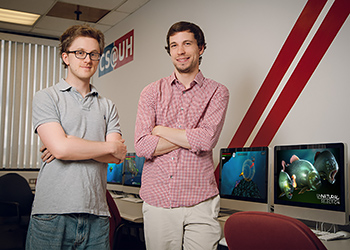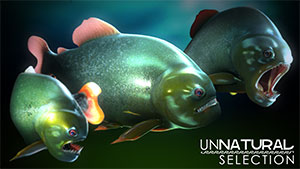Team Advances after Participating in 10-Week Start-Up Mentoring Program
 University of Houston’s computer science students continue proving the UH game design
program is one of the best in the nation and perhaps the world.
University of Houston’s computer science students continue proving the UH game design
program is one of the best in the nation and perhaps the world.
Randal Staewen and Sean Howard, known as Team Solipsoid, are one of three U.S. teams advancing to the Microsoft Imagine Cup World Semifinals. Team Solipsoid will represent the U.S. in Game Design; the other two teams represent the Innovation and World Citizenship (software design) categories.
First UH Team to Make World Semifinals
 “Team Solipsoid is the first UH team to advance to the World Semifinals,” said Chang
Yun, interactive game development instructor and research assistant professor in the
College of Natural Sciences and Mathematics. “For the past five years, the Department
of Computer Science’s game design teams have made the U.S. finals, showing the strength
of the Interactive Game Design Program. Making the World Semifinals is the next big
step.”
“Team Solipsoid is the first UH team to advance to the World Semifinals,” said Chang
Yun, interactive game development instructor and research assistant professor in the
College of Natural Sciences and Mathematics. “For the past five years, the Department
of Computer Science’s game design teams have made the U.S. finals, showing the strength
of the Interactive Game Design Program. Making the World Semifinals is the next big
step.”
To represent the U.S. in the World Semifinals, the team first competed in Microsoft’s U.S. Imagine Fund program, an early-stage student startup fund and school. Microsoft selected 11 teams for Imagine Fund, providing each team with $10,000 in seed money to kick off their business and a 10-week immersive program. Teams gained access to tools, learning resources, technical experts and 1:1 mentoring.
The Game: Unnatural Selection
Team Solipsoid’s game, called “Unnatural Selection,” is set far in the future, where a war between machines and organics ended with the victory of the machines. However, the machines eventually get bored, and begin to recreate life inside an aquatic test facility.
 “The player takes the role of a rapidly mutating aquatic species and tries to eat
everything it can to grow large enough to escape,” said Staewen, a second-year computer
science graduate student. “Players control the path of evolution through their diet
and unlock further mutations by completing objectives.”
“The player takes the role of a rapidly mutating aquatic species and tries to eat
everything it can to grow large enough to escape,” said Staewen, a second-year computer
science graduate student. “Players control the path of evolution through their diet
and unlock further mutations by completing objectives.”
The game is designed as a fully-featured online multiplayer. “You can play alongside your friends and compete for the limited food supplies. In this competitive, futuristic world, your friends are also on the menu,” Staewen added with a laugh.
The inspiration for Unnatural Selection came from several games in the past, the most recent being Spore. “Not even Spore had a real-time multiplayer component, and I remember thinking what a missed opportunity that was,” he said.
Staewen asked Howard to join the team in late fall 2013; the two had learned how to use Unity, Unnatural Selection’s game engine, together the previous summer. Howard was on one of UH’s Microsoft U.S. Imagine Cup finalist teams in 2013.
Ten Weeks of Mentoring
The Imagine Fund program began in early February and culminated with Pitch Day on April 25. A mentor was assigned to each team to guide it through the process from concept/idea to having built their company and product.
“The program was intense, with two-hour video conferences twice a week for 10 weeks,” Staewen said. “It’s been a good experience for many reasons. I’ve learned how to talk about this game with people who aren’t familiar with games. The ability to communicate is essential if I want to get the support needed to successfully launch this product.”
The Road to the World Semifinals
During Pitch Day, teams presented their product and five-minute pitch to an online audience of industry expert judges. The presentations were evaluated and scored on the following criteria: concept, innovation and impact, execution and feasibility. Game entries had an additional evaluation of the “fun” factor and whether the game was exciting to play, offered good player feedback, was appropriately challenging, and left the player wanting to keep coming back for more.
At the end of the day, Microsoft selected three finalists (one from each of the competition categories) to participate in the Imagine Cup World Semifinals.
“Our game will be judged against other games selected worldwide for the semifinals,”
Staewen said.
“I’m pretty confident about our game’s strength, so I’m optimistic about our chances
of reaching the finals.”
The U.S. team with the highest rank worldwide will advance to the World Finals event hosted in Seattle in July 2014.
- Kathy Major, College of Natural Sciences and Mathematics